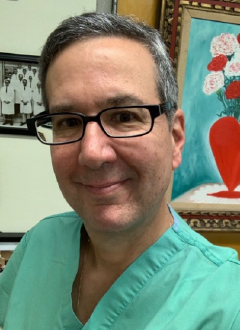Gregory Trachiotis1,2, Jin Ye Yeo3
1Division of Cardiothoracic Surgery, Veterans Affairs Medical Center, Washington, DC, USA; 2Department of Surgery, George Washington University, Washington, DC, USA; 3VATS Editorial Office, AME Publishing Company
Correspondence to: Jin Ye Yeo. VATS Editorial Office, AME Publishing Company. Email: vats@amegroups.com
This interview can be cited as: Trachiotis G, Yeo JY. Meeting the Editorial Board Member of VATS: Prof. Gregory Trachiotis. Video-assist Thorac Surg. 2025. Available from: https://vats.amegroups.org/post/view/meeting-the-editorial-board-member-of-vats-prof-gregory-trachiotis.
Expert introduction
Prof. Gregory Trachiotis (Figure 1) is a Professor of Surgery and Biomedical Engineering and Chief of Cardio-Thoracic Surgery at The George Washington University Medical Center, and Chief of Cardiothoracic Surgery and Director of Heart Center, at The Veterans Affairs Medical Center/Capitol VISN-5 Network. His clinical and surgical interests include end-stage heart and lung disease, video-assisted thoracic surgery (VATS), lung cancer, coronary artery disease, aortic and mitral valvular disease, off-bypass coronary revascularization, mini-pump technology and surgery for heart failure, Transcatheter valve therapy. He is board-certified by the National Board of Medical Examiners, American Board of Surgery, and American Board of Thoracic Surgery in Cardiothoracic Surgery, and General Surgery. He has earned numerous awards including Washingtonian Top Doc (2005, 2008, 2010, 2012, 2014 2015, 2016, 2017, 2019, 2020, 2022, 2023, 2024), Castle Connelly Top Doc 2024/25; Outstanding Chief of Surgery Resident Award, Department of Surgery, at The George Washington University, to name a few.
Prof. Trachiotis is also the Principal Investigator on several clinical studies. He maintains an FTE resident Cardiothoracic research program since 2011. He has more than 300 publications and presentations on his research findings at both the national and international levels, including those published in Annals of Thoracic Surgery, Hospital Physician, Chest, American Surgeon, Journal of Thoracic and Cardiovascular Surgery, and Surgical Rounds; Nature, SCIENCE, VATS, HSF and several Editorial Boards.

Figure 1 Prof. Gregory Trachiotis
Interview
VATS: What inspired you to pursue a career in cardiothoracic surgery, and how has your journey led you to your current roles at The George Washington University Medical Center (GWUMC) and the Veterans Affairs Medical Center (VAMC)?
Prof. Trachiotis: My mentors as a student and a resident, Dr. L. Thompson Bowles, Dr. Benjamin Aaron, and Dr. William Hix, played a significant role. I committed to a cardiothoracic surgery career as a 3rd year Medical Student after spending the summer taking care of PIG heart transplant recipients. Not to mention my mentors who continued to support and follow my career: Dr. James Cox, Dr. Alec Patterson, and Dr. Sudhir Sundaresan. My career at the VAMC has allowed me to serve our Veterans while committing to education, teaching, and research at both the VAMC and GWUMC.
VATS: What were some of the key milestones in your early career that shaped your current approach to medicine and surgery?
Prof. Trachiotis: Each case, patient, and family interaction, especially with the Veterans I serve is a continued honor and privilege.
VATS: You have extensive experience with minimally invasive techniques, including video-assisted thoracic surgery (VATS). Could you share an overview of the recent advances in VATS, and how they have impacted your practice?
Prof. Trachiotis: I believe the multidisciplinary team approach, screening, early diagnosis of Lung Cancer, improved optics of VATS, and Enhanced Recovery After Surgery (ERAS) anesthetic management have improved VATS.
VATS: Given the complexities of treating end-stage heart and lung diseases, what are some of the biggest challenges you face when exploring innovative surgical techniques or treatment modalities? How do you overcome them?
Prof. Trachiotis: We need to adopt and maintain collaborative bridges and team approaches to each specified area in Cardiothoracic Surgery—whether for aortic disease, valve or transcatheter therapies, coronary disease, and thoracic oncology. As surgeons, we need to be adopters and advancers, and take the lead in evolving technology, therapies, and research.
VATS: What advancements in VATS do you foresee in the next decade, and how can the field continue to evolve to meet the growing need for specialized care?
Prof. Trachiotis: I can see VATS becoming even more focused and targeted with perhaps limited or direct energy or targeted (chemo immune) therapy into focal lesions, and part of a global patient care regimen in lung cancer. I can see liquid biopsy playing a huge role in screening, diagnosis, and surveillance.
VATS: You have been recognized with several prestigious awards, including being named Washingtonian Top Doc several times. What do these recognitions mean to you personally and professionally, and what advice do you have for aspiring doctors who wish to succeed in such a challenging field?
Prof. Trachiotis: It is always nice and rewarding to be recognized by your peers, fellow team members, and especially our patients and families. I truly believe being an effective leader—is to lead by example.
VATS: How has your experience been as an Editorial Board Member of VATS?
Prof. Trachiotis: VATS has been an extremely collaborative, collegial, and friendly experience. My fellow Editorial Board members are all superb clinicians and experts, and I am humbled to be a member and contributor to the Editorial Board at VATS.
VATS: What are your expectations and aspirations for VATS?
Prof. Trachiotis: I believe at VATS, we continue to promote and publish the most important advances, reviews, and guidelines—each topic changes, yet it can be our responsibility to provide the most up-to-date information to practicing Cardiothoracic Surgeons and Thoracic Oncology teams more broadly.
